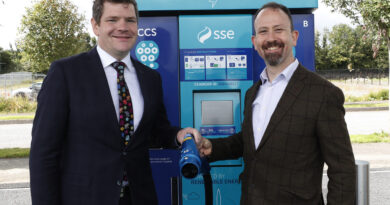EV charging network may breach equality laws for disabled drivers
New research has claimed that the electric vehicle charging network is failing to meet the needs of disabled drivers.
Investigators from Auto Express have stated that many of the UK’s 2.5 million Blue Badge holders risk being “excluded from Britain’s EV revolution” and charging providers are “systematically failing” to meet their accessibility obligations under the Equality Act.
Auto Express has since launched the ‘Equal Access for All’ campaign and is hitting out at the government for moving too slowly to protect the interests of disabled drivers.
As part of the campaign, it is demanding urgent provision of accessible EV charge sites, government regulation on minimum numbers and for companies to meet Equality Act 2010 obligations.
EV-driver and elite paralympic basketball player Ade Adepitan has backed the calls, telling Auto Express that existing charging infrastructure is often “rubbish” and does not work for the disabled community.
Adepitan has driven a Tesla Model S adapted with hand controls since 2016 and has racked up almost 40,000 miles in his EV. He said: “Is the infrastructure perfect? Far from it. Does it work for the disabled community? Absolutely not.
“I’m so lucky because I’m a really able disabled person, but there are so many charge points that are rubbish. I’ve been cursing and swearing so many times; If I get too close to the charge point, then I can’t open the door to get my chair out, and if I go further away then I’m too close to the curbside. Other chargers are either too high and you can’t see the screen, or they’re in an awkward position for you to plug the cables in.
“It’s awkward, but that’s just like the public transport system, and challenges aren’t new to any disabled person. We need to get more disabled people driving EVs.”
Issues surrounding EV chargepoints for disabled drivers include the units being too tall, meaning screens could not be seen clearly from a seated position, while charging sockets and cables were typically mounted high-up on weighty and unwieldy cables and could be difficult to extract. The research also identified a lack of appropriate lighting, high kerbs and cramped charging bays with no wheelchair access.
Catherine Marris, Head of Innovation at Motability, said: “Our research identified that by 2035, up to 1.35million disabled people will be wholly or partially reliant on public charging infrastructure, but that it has not been designed with their needs in mind.
“As the 2030 ban on the sale of new petrol and diesel cars approaches, it is imperative that disabled people aren’t left behind in the race to install the UK’s charging infrastructure. Work to secure accessibility standards is vital as the rapidly expanding chargepoint market means that many operators may lock in designs and infrastructure for many years without considering accessibility for disabled users.”
Fazilet Hadi, head of policy Disability Rights UK said: “Charging points should be accessible to wheelchair users, those with dexterity issues and people with sensory impairments. Those commissioning charging points without considering their duties under the Equality Act are breaking the law. The Government needs to take urgent action to prevent thousands of inaccessible charging points being installed. It’s turning the clock back on the needs of disabled customers.”
As part of the campaign, Auto Express also spoke to a number of leading EV charging providers.
“There is a need for clear legislation on what minimum standards should be met for any new EV charging bays,” said Osprey, which has 450 chargers nationally, with plans for another 2,000 by 2024.
BP Pulse, which has over 8,000 charge points, said: “We’ve set up an accessibility team to focus on these issues.”
Adrian Keen, CEO at Instavolt which has 600 chargers with plans for another 5,000 by 2025 said: “I often speak to customers directly on these issues and we are engaged with Motability to further understand the challenges that drivers who need accessibility spaces face when trying to charge their car. We know more must be done to make EVs as easy to use and inclusive as possible.”
Pod Point which has over 5,200 chargers said “We don’t hold data on how many of our chargepoints serve accessible bays. Pod Point is currently working with industry to establish best practice for the provision of accessible charging infrastructure, whilst working with its chargepoint hosts (who own the chargers) and partners. The process will consider the provision of a certain proportion of chargepoints to be specifically accessible for disabled users.”






